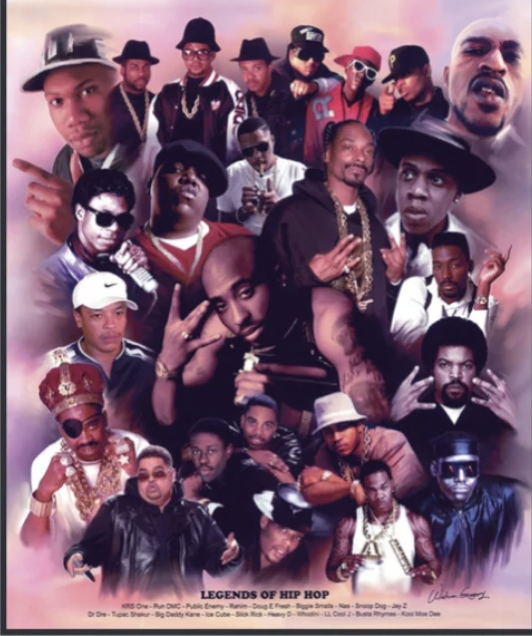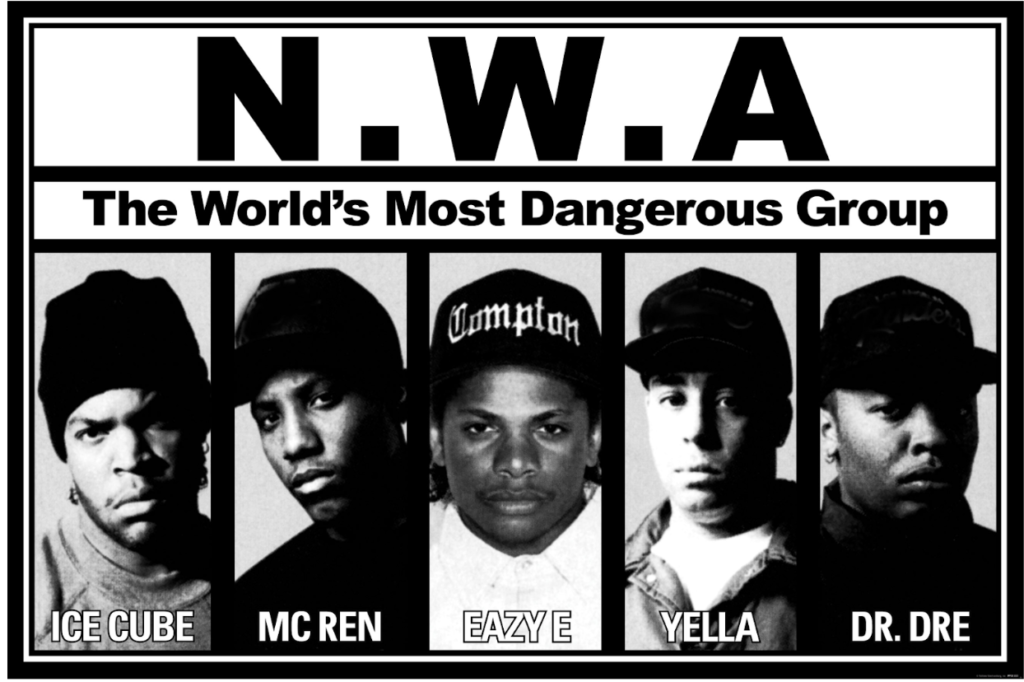Hip hop artists truth-tell the past
by Mena Brook
Hip hop and rap has always been a genre of music that speaks to the experiences of Black and Brown communities. It emerged as a response to the political and social turmoil of the 1970’s and 1980’s, a time of great inequality and injustice for marginalized communities in the United States. Music became a form of protest against racism, poverty, and police brutality. Today’s artists continue this tradition not only to tell the truth about past struggles but also to connect with their listeners emotionally and to inspire change.

But before we talk about history, let’s talk about reality. Eric Harvey who teaches at the School of Communications at Grand Valley State discussed how the emergence of reality TV was influenced by gangsta rap which contrasted with mainstream entertainment while also utilizing similar techniques. So-called “reality rap” by artists such as Ice Cube and Ice-T, it played a part in a larger cultural movement seeking to redefine popular entertainment as a means of conveying truth. If history is “past reality,” current reality is “future history” in the making.
African Americans and Latinos in particular who have long endured systemic racism and persecution have not only found their voices via hip hop and rap music, but also found a way to retell the past. Rappers have brought attention to social concerns by expressing their experiences and tales thereby creating a forum for debate and activism. Rap music has been used as a tool for cultural expression and empowerment enabling people to connect with others who share their experiences and values and express themselves creatively.
One example of history rappers is a verse from N.W.A’s “f**k tha police”: “Police, Im saying f**k you punk readin’ my rights and shit, it’s all junk pulling out a silly club, so you stand with a fake ass badge and a gun in your hand.” This verse reflects the historical context of police abuse of power and excessive force towards Black prevalent during the 1980’s and early 1990’s such as the Rodney King beating which was caught on camera—, allowing hip hop artists to capture the true experience in their “verses” and comment on it. The mention of a “silly club” and a “fake ass badge” implies that the police are not deserving of the authority they hold and that they are abusing their power to intimidate and harm Black individuals.

While accurately depicting reality has become an important aspect of hip hop music, the ultimate goal is often to effect change in the world by inspiring action or sparking a conversation about change. American humorist Mark Katz reports in his introduction to “Build.”“Hip hop saved my life”, It’s often said quite literally—that hip hop offered an alternative to addiction, crime, poverty, or despair.” One of the teens he worked with even wrote that ,Hip-Hop is the “guiding thread of a light that rescues young people from crime and makes them think that through culture there is a way out.” He is not alone. Numerous Hip hop fans and artist communities have emerged uniting over one’s hardships in history.
The urge to reshape history often stems from a profound appreciation for the lessons of the past and a commitment to ensuring that its crucial narratives are told and retold, so that they remain firmly engraved in our memory. Another example where an artist’s rap invokes history is in Kanye West’s “All Falls Down” whose line “40 acres and a mule,” refers to a promise made to formerly-enslaved African Americans during the Reconstruction era in the United States. This promise, which remained mainly unfulfilled, was made in order to provide freed slaves land ownership and a means of achieving economic independence and self-sufficiency. West’s verse, “we tryna buy back our forty acres,” suggests that the Black community is still fighting for social and economic equality and trying to reclaim what has been lost and taken from them. Here is a rap historian’s reminder of the need to both literally and symbolically recover a sense of ownership.
Juan Siliezar, a Harvard Staff Writer titled “Protesting police violence, a playlist” makes one think of hip hop as a “historical record of the nation’s racial violence and injustice.” In an interview with Marcyliena Morgan, who teaches African and African American Studies and who founded the Hiphop Archive and Research Institute, discusses how hip hop tells amazing tales about your neighborhood. At the very beginning of hip-hop, she notes, you had to deal with contradictions like, “New York is terrible! I cherish New York. And once it becomes evident that hiphop rejects simplification when addressing injustice—that is, that there will never be a time when everything will be perfect or the notion that there will always be an idyllic setting—you are prepared for hip hop.
If history is a way of learning from the past, music and activism have the power to bring people together in a shared understanding of their past and a collective vision for a better future. The video, “ Public Enemy Is Joined By Nas, Black Thought & More For Rendition of Fight The Power” lets us recognize that “this generation hasn’t simply started a movement, they’ve joined one.” Hip Hop heads who have been there, heard that, and have seen and encountered the struggle that has been discussed will influence the next generation. This video celebrates resistance, emphasizing that giving up is not an option. This video and music can inspire listeners to keep moving forward and find strength in their struggles. It fosters a sense of community and understanding among those who share similar experiences and encourages them to fight against oppression and injustice. As part of the hip hop nation listeners can find empowerment and realize their ability to effect change, ultimately leading to a commitment to continue fighting for a better future.
In another song by Nas, “Accident Murders,” one verse stands out: “The system is twisted, false representation, We livin’ in the downs, where the up is mistaken.” In this verse, Nas is commenting on the systemic issues that have plagued America’s justice system for decades, notably “false representation” which has been employed to defend institutionalized racism and oppression. Nas also touches on the theme of economic inequality by saying that “we’re living in the downs, where the up is mistaken.” This is a reference to how historically disadvantaged populations, especially those in cities, have been denied access to opportunities and resources that are available to wealthier, more privileged people.
Overall, then, hip hop music quickly became a powerful means of connecting with history and the past. By incorporating historical references and samples, addressing social and political issues, and sharing personal stories and experiences, hip hop artists create music that speaks to the struggles and challenges faced by marginalized communities. Through their music hip hop and rap artists bring attention to important issues and provide a platform for individuals to connect and share their experiences creating a sense of community and solidarity that is vital for achieving future social change.